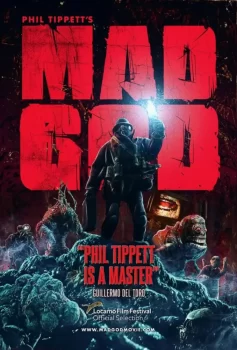Mad God – Dir Phil Tippett (Film Review – Shudder)
Mad God is a stop-motion animated horror film written, produced and directed by Phil Tippett, a film that captures the passion of an artist pouring 30 years of their life into an immensely masterful personal project.
Starring: Alex Cox and Anthony Ruivivar
Mad God is a weird and wonderful film, a terrifying and often-unsettling animated masterpiece that could very well be later found to induce madness in anyone able to both sit through and enjoy the film beyond its brutal and visceral visuals.
Being a film weirdo who watches everything weird and disturbing, there’s so much to appreciate in the construction of Mad God that it’s an experience that almost hits you immediately on a guttural level, staying on the cusp of soul nausea for the film’s runtime.
The colours of the hellish landscape we’re thrown into, cold and rigid squeaks of leather gloves, the scattering of mutated insectoid feet. It’s aesthetically delicious in the same skin-crawling manner as Hellraiser/The Cenobites, a macabre combination of beautifully unsettling visuals and sounds that infect your senses.
I could honestly just wax lyrical about this film on a descriptive level for most of its plot; everything is creepy, sculpted by and for pure madness, and there’s no doubt it will become both a cult classic in years to come along with occupying a top spot at every awkward, edgy teenage movie night.

Mad God is the 30-year hellish love-child of Phil Tippet, an absolute legend in the visual effects industry, whose animation credits include A New Hope, The Empire Strikes Back, RoboCop and Willow, and the man responsible for visual effects in Piranha, Honey, I Shrunk the Kids, Jurassic Park, and Dragonheart, to just touch on his most nostalgic work.
Watch any documentary that involves Tippet and you’ll hear him discussing the transition from various approaches to visual special effects throughout his time working in the film industry, and it always struck me that Jurassic Park, the breakthrough melding of CGI and puppetry, was a moment that Tippet saw the end of his passion, the beginning of the end for an obsolete passion and creative expression.
Mad God has that autobiographical shard within it, a film that feels almost like a creative outburst and lashing out, an attempt to capture the absolute purest and truest expression of the craft before it dies out entirely, to document it for the future.
I could draw some comparisons with the themes of Mad God here, that it’s a story about a hopeless journey into an unknown, desolate landscape with an impossible mission. Within that, there’s beauty, horror, hope, tragedy, survival, and rebirth, driven by a relentless determination from the narrative lead.
But just as our individual experience of life is unique, Mad God feels like the type of strange, unsettling story that will be individually loved or dismissed for equally varied reasons. The story itself takes place in a desolate and hellish world, filled with mutants, assassins, torture, gore, alchemy and monsters.
We follow an Assassin (Killzone video game fans rejoice) as they attempt to complete a mission within this bizarre landscape, and eventually begin to learn the deeper and larger forces at work surrounding the mission and the world itself.
There’s nothing more to say about Mad God that isn’t worth discovering for yourself; it’s not a film for everyone, but it’s most certainly a film that has value for anyone who loves cinema, animation, technical effects, or hellish, twisted landscapes and stories. In that sense, it’s a creative masterpiece of its kind, one that was both worth waiting 30 years for, and worth remembering for 30 years to come.
Oxford Lamoureaux
- The Dead South – Powerstation: April 5, 2024 (Concert Review) - April 6, 2024
- Queens of The Stone Age – Spark Arena: February 29, 2024 (Concert Review) - March 1, 2024
- Dune: Part Two – Dir: Denis Villeneuve (Film Review) - February 29, 2024
